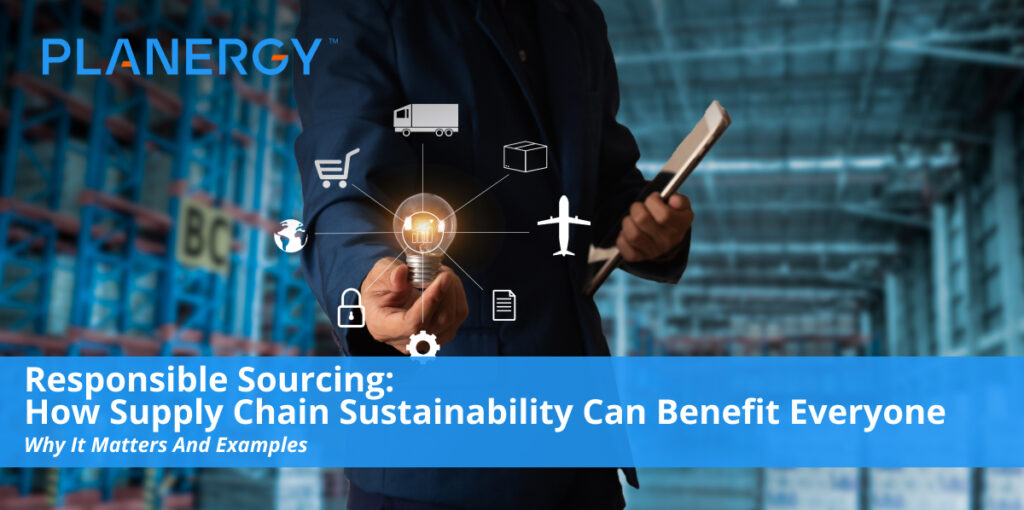Responsible Sourcing: How Supply Chain Sustainability Can Benefit Everyone
As global supply chains become increasingly interconnected, far-reaching, and more diverse, business opportunities have grown accordingly. But the rise of the consumer class has increased and presented a challenge for the procurement industry. How can sourcing practices meet demand while also remaining sustainable and ethical? it is a strong corporate social responsibility issue, with the capacity to address a number of fundamental issues from the living conditions of workers to the environmental sustainability of operations. Responsible sourcing gives companies a chance to make a positive substantial impact in their sphere of influence.
McKinsey and Company
Research from McKinsey and Company indicates that population growth along with increased wealth distribution over the next five years could significantly affect consumer patterns globally. Estimating when an additional 1.8 billion people will have living circumstances that enable them to be active consumers by 2025 (a 75% increase from 2010) the research firm remains positive about the market’s growth potential.
At the same time, however, the enterprise value for the top 50 worldwide consumer goods companies is compromised by a range of issues that threaten to undermine it such as carbon emissions, pollution, labor violations, and employee working conditions.
Solving the operational issues while still meeting consumer demand forms the basis of a well-implemented, ethical, and responsible supply chain. According to McKinsey’s research, the supply chain of a consumer goods company is likely to account for 80% more greenhouse gas emissions than other Industries as well as over 90% more environmental damage. A lack of transparency in the supply chain is generally linked to a decrease in standard because primary suppliers may subcontract portions of work to secondary entities. This makes it difficult and sometimes impossible for companies to address the root cause of the issues.
Gartner
The research director at Gartner has commented on the increasing importance of responsible sourcing. It has moved from being something that is nice to have to something that plays an integral role in how companies are working to protect their brand reputation, ensure business continuity, and create a competitive advantage.
In today’s market, consumers, shareholders, and governments demand a company and its suppliers to have integrity. The responsibility is on enterprises to make a positive impact on society and it has never been greater.
So it may be that conscientious consumer demand has made responsible sourcing less of an option and more of a necessity. Adoption in consumer-facing Industries has evolved more rapidly though companies across all industries will feel the pressure to change sooner or later. In the near future, the inclusion of sustainability criteria in sourcing decisions will be part of supplier quality. It will be expected and non-negotiable.
Instead of starting from scratch, supply chain leaders should leverage information from industry associations such as the Responsible Business Foundation, to determine focus areas that are relevant to their industry. They can use predefined supplier audits to make the remediation process simpler and increase social compliance.
Deloitte
Research firm Deloitte has also addressed the challenges of responsible sourcing saying that by effectively addressing labor risks and supply chains, businesses need to engage in bold action from individual companies and collective action across companies, suppliers, and policymakers along with providers of new tools and solutions.
Deloitte notes that global supply chains are complex and not easily understood. Nearly half of executives identify this as the primary roadblock to building more responsible supply chains. Advanced technology such as data analytics software makes it possible to increase end-to-end transparency. The market for socially-responsible supply chain tools is potentially highly profitable with a potential $2.7 billion market valuation in the next five years.
The issue is the not a single approach will yield a complete solution. It instead will require a combination of technology combined with dedicated change management to achieve optimal results.
With a basic understanding of responsible sourcing and how it impacts the supply chain, let’s take a closer look at some industry-leading responsible sourcing programs. We’ll take a closer look at leaders in the consumer goods, tech, food, and retail industries, are meeting expectations.
Responsible sourcing means working with suppliers to reduce your environmental impacts, fighting human trafficking, modern slavery, and child labor, and being as transparent as possible with both stakeholders and consumers.
Unilever
Unilever considers responsible sourcing a wonderful opportunity to strengthen its supply chain while also mitigating risk in developing trust with stakeholders and consumers. The policy emphasizes 10 fundamental principles ranging from supporting workers’ rights to corporate integrity and engaging with various sustainability initiatives.
The company estimates that its products are used by 2.5 billion people every day so the company believes its far-reaching significance only increases the importance of its responsible sourcing. That’s not to say this is a recent development. In 2010, Unilever set a target of achieving 100% sustainably-sourced raw materials by 2020. By the end of 2019, it had managed to achieve 62% overall for an increase of 48% from its 2010 starting point.
For maximum impact, the company prioritized the sourcing of palm oil, sugar, soy, tea, vanilla, cocoa, and other common raw materials that make up the majority of its volume. Across these important items, they achieved a responsibly-sourced rate of 88%
Intel
On the official Intel website, the company states that its choices impact millions of lives. They believe demonstrating the scope of responsible sourcing goes beyond the borders of the food or consumer goods Industries and as such have made a dedicated at it to an effort to ensuring the materials they use in manufacturing their electronics are supplied from Conflict Free Zones. Intel’s work began more than a decade ago in 2009. They have gone to great lengths to ensure that its supplies of tungsten, tin, tantalum, and gold, (known as 3TG) from the Dominican Republic of Congo and neighboring countries don’t come from mines that are funding criminal or anti-humanitarian groups. From this, Intel expanded the parameters of responsible sourcing to all materials and all countries.
Intel has been highly efficient and successful when it comes to consolidating a supply chain to include only companies that adhere to its ethical guidelines. They released a white paper with more detailed information. Based on a survey of smelters and refineries that ran from 2012 to 2018, the company’s efforts have seen an 80% increase in compliance to achieve a 100% compliant supply chain.
Its approach is based on three crucial areas – fostering accountability in the supply chain, encouraging more action within the industry, and creating traceability by working with suppliers.
Nestle
Nestle, the Swiss multinational food manufacturer, is a champion of responsible sourcing in the food industry. They placed a protective emphasis on individuals, communities, and the planet. Acknowledging that business continuity and the welfare of their constituent parts are closely interconnected, Nestle has revised its operating model, implemented sustainable sourcing practices, and engaged in various enrichment initiatives within its supplier ecosystem.
Nestle’s corporate website mentioned that some of their activities have included:
- Compiling a transparency report on its 15 priority raw materials (the latest edition available here).
- Setting goals of achieving 80% audited and compliant Tier 1 suppliers, as well as 80% traceability on spend and volume by the end of 2020.
- Engaging suppliers to adhere to the strict guidelines of the company’s Responsible Sourcing Standard (RSS).
Nestle is also focusing efforts on four critical areas: natural capital, animal welfare, human rights, and transparency. Nestle has partnered with WWF Australia and BCE Digital Ventures on “OpenSC” which is a blockchain platform that allows customers to trace food back to his farm Origins. Do it is still in development, the trial run last year trays to milk from producers in New Zealand to the company’s factory and warehouse is in the Middle East. Nestle also plans to open-source data on its supply chain so it can disclose suppliers to demonstrate its commitment to progress.
M&S
M&S highlights that in the retail world, establishing trust in meeting customer expectations is a must in today’s market. Be on the ethical responsibilities of maintaining an accountable supply chain, M&S also emphasizes that doing so just makes good business sense. Increasing pressure on natural resources and poor global stewardship increases costs restricts access to key raw materials and makes the global supply chain more volatile.
The company sells 3 billion items a year from more than 2,000 suppliers that are sourced from 20,000 farms and 100,000 smallholders. M&S estimates that its supply chain features somewhere around two million people so demonstrating an awareness of its own ecosystem is as important as demonstrating the scale of any practical solution. They achieved an innovative step toward greater transparency in 2016 when they made an interactive map available. It allows the public to locate its clothing and food manufacturers worldwide. M&S’ overall approach to be broken down into four key areas with two components:
Understanding the M&S supply chain and establishing a consistent, minimum standard across it.
- Incorporating defined global sourcing principles.
- Maintaining supply chain transparency.
Continuous and rigorous monitoring and assessment of suppliers to ensure standards are met.
- Monitoring and assurance.
- Handling grievances and complaints.
Working with suppliers to increase capacity and therefore capability.
- Worker training programs.
- Global community outreach program.
Close collaboration on difficult issues which cannot be resolved by M&S alone.
- Encouraging a convergence on ethical sourcing practices.
- Advocating for public policy in local areas of operation to maintain workers’ rights, health, and safety, etc.
Sourcing has become a differentiator between brands that create success through system sustainability in those who fade away from popular acceptance. Responsible sourcing of materials requires a complex Network to collaborate in harmony. organizations know the risks involved in sourcing materials responsibly, sustainably, and ethically, and they want you and their stakeholders to know they’re trying their hardest to manage those risks and provide you as the customer with quality and sustainable products.
By working to perform due diligence when selecting suppliers, you can ensure that the vendors you work with engage in responsible sourcing practices, too. You can always ask to tour the factory or the areas where your raw materials are produced. To get started, consider auditing your current value chain. When looking for new vendors or implementing new sourcing strategies, require that any new contracts abide by a code of conduct.




